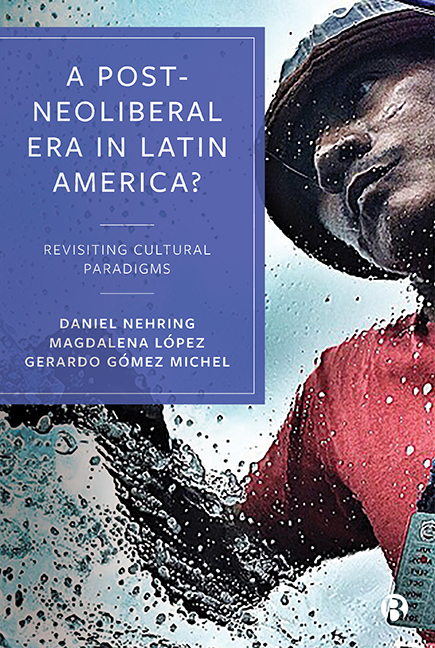Book contents
- Frontmatter
- Contents
- List of Tables and Figures
- Notes on Contributors
- 1 Introduction: Everyday Life in (Post-)Neoliberal Latin America
- 2 Imaginaries, Sociability and Cultural Patterns in the Post-Neoliberal Era: A Glance at the Argentinean, Paraguayan, and Venezuelan Experiences
- 3 Making Neoliberal Selves: Popular Psychology in Contemporary Mexico
- 4 From Uribe’s “Democratic Security” to Santo’s Peace Accords with the FARC: Hate, Fear, Hope and other Emotions in Contemporary Colombian Politics
- 5 Cine Bajo Tierra: Ecuador’s Booming Underground Cinema in the Aftermath of the Neoliberal Era
- 6 Neoliberalising Humanity: Culture and Popular Participation in the Case of the Street Market of Caruaru, Brazil
- 7 The Contribution of the Catholic Magazine Espacio Laical and the Constitution to the Cuban Public Sphere
- 8 Argentina: The Philosophical Resistance to the Conquest of the Soul1
- 9 Fleeing (Post-)Chávez Memories: The 1990s and the Black Friday Generation
- 10 Re-imagined Community: The Mapuche Nation in Neoliberal Chile
- 11 Neoliberalism and the Negotiation of the American Dream in Contemporary Latina Narratives
- 12 Bare Life in Contemporary Mexico: Everyday Violence and Folk Saints
- Index
7 - The Contribution of the Catholic Magazine Espacio Laical and the Constitution to the Cuban Public Sphere
Published online by Cambridge University Press: 20 April 2022
- Frontmatter
- Contents
- List of Tables and Figures
- Notes on Contributors
- 1 Introduction: Everyday Life in (Post-)Neoliberal Latin America
- 2 Imaginaries, Sociability and Cultural Patterns in the Post-Neoliberal Era: A Glance at the Argentinean, Paraguayan, and Venezuelan Experiences
- 3 Making Neoliberal Selves: Popular Psychology in Contemporary Mexico
- 4 From Uribe’s “Democratic Security” to Santo’s Peace Accords with the FARC: Hate, Fear, Hope and other Emotions in Contemporary Colombian Politics
- 5 Cine Bajo Tierra: Ecuador’s Booming Underground Cinema in the Aftermath of the Neoliberal Era
- 6 Neoliberalising Humanity: Culture and Popular Participation in the Case of the Street Market of Caruaru, Brazil
- 7 The Contribution of the Catholic Magazine Espacio Laical and the Constitution to the Cuban Public Sphere
- 8 Argentina: The Philosophical Resistance to the Conquest of the Soul1
- 9 Fleeing (Post-)Chávez Memories: The 1990s and the Black Friday Generation
- 10 Re-imagined Community: The Mapuche Nation in Neoliberal Chile
- 11 Neoliberalism and the Negotiation of the American Dream in Contemporary Latina Narratives
- 12 Bare Life in Contemporary Mexico: Everyday Violence and Folk Saints
- Index
Summary
In contemporary political, cultural and communicational debates, the idea of the public sphere has a notable presence. According to the classical Habermasian perspective, the public sphere is the realm of social life in which public opinion can be shaped by principles such as free access for all citizens, inclusion, reciprocity, reflection, equality, and the rational justification of arguments. In this domain, people act as public when they discuss topics of general interest in conditions of equality and without coercion. These conditions guarantee, in normative terms, that the citizens can meet freely to express their opinions and points of view (Habermas, 1989). Nancy Fraser defends the influence of public discussions on decision making and believes that the formation of public opinion can be a counterweight to discourses in formal deliberative arenas. She adds that sometimes the arguments put forward by civil society actors succeed in influencing the decisions of executive and legislative powers (Fraser, 1992). Reinforcing that idea, Avritzer and Costa (2004) argue that issues, positions, and arguments defended by the new social actors must infiltrate the state through institutional mechanisms, and thus democratize and put it under the control of citizens.
However, not all real public spheres are democratic, since cultural and material inequalities determine the differentiation between publics and their capacities, especially in spaces characterized by dependency relations and state interference (Chaguaceda, 2011). It has been pointed out that a merely conversational public sphere will not succeed in subverting power relations or guaranteeing the pursuit of the common good. The Habermasian model has also been criticized because it is confined to the analysis of the bourgeois public sphere and ignores that, together with the formation of the dominant bourgeois public, the publics were composed of peasants, workers, women, and nationalists, who constituted competing public spheres (Fraser, 1992) and complement each other. Therefore, one should not speak of sphere (singular) but of public (plural) spheres that together form the public space.
In later texts, Habermas admits the coexistence of various public spheres and the need to observe the dynamics of the communicative processes that occur outside the dominant spaces of discussion.
- Type
- Chapter
- Information
- A Post-Neoliberal Era in Latin America?Revisiting Cultural Paradigms, pp. 135 - 158Publisher: Bristol University PressPrint publication year: 2019



